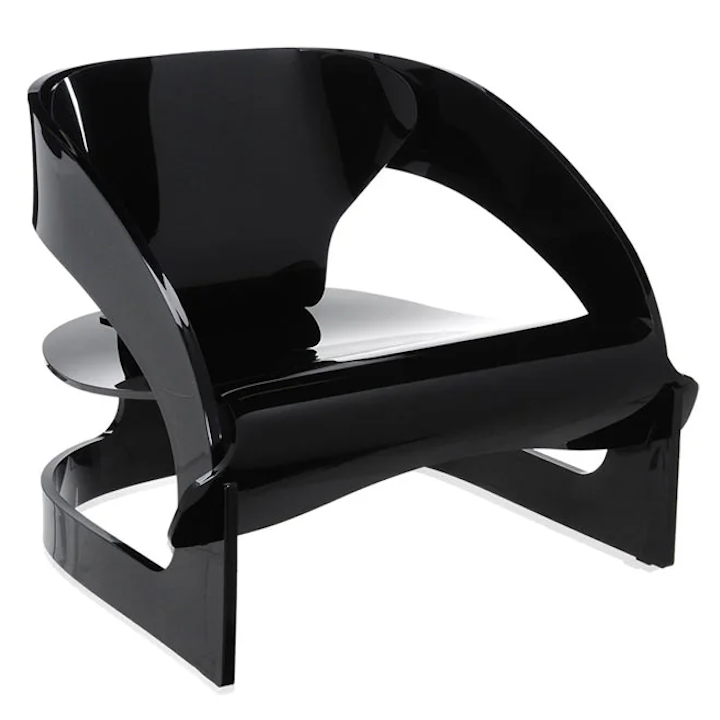 Joe Colombo
Joe Colombo
Joe Colombo, Italian, born in 1935. Not to be mistaken with the Mafia don who carried the same name, Italian designer Joe Colombo was in a league of his own. Joe Colombo, born Cesare Colombo (30 July 1930 – 30 July 1971) was Italy's most influential and promising designers during the 1960s. He combined form with function and created utterly beautiful space-age designer objects such as the Boby Trolley, the Fresnel Lamp and the Colombo Chair. Joe Colombo designed products for Oluce, Kartell, Bieffe, Alessi, Flexform and Boffi; most of these are still available today through Stardust. Painter, sculptor, architect and designer, Cesare Colombo was an icon of the sixties in Italy. He called himself Joe in homage to the American singer Joe Turner. In 1951 when the clubs Arethusa and Santa Tecla opened in Milan he used to go there with his friends Enrico Baj and Sergio Dangelo to listen to jazz. In the meantime he was designing città nucleari (nuclear cities) an adventurous journey into the society of the future, a paradoxical invention of a new utopian habitat. Joe Colombo (1930-1971) was born in Milan, Italy and went to school at the Brera Academy of Fine Art where he studied painting and sculpture. He entered the avant-garde art scene of the early fifties as part of the "Nuclear Movement" of painters who sought to break down the formal, static boundaries of painting with more organic images bursting out of the growing international anxiety about the nuclear bomb. This was the perfect environment for Colombo to begin germinating his philosophies on designs for the future. His sketches and plans for underground "nuclear cities" included airways crowded with space shuttles and rockets and a subterranean metropolis with layers for storage, transportation and living. Throughout his professional life he would focus some of these more outrageous visions into a design aesthetic built on the theory that, "we will have to make the home live for us, for our needs, for a new way of living more consistent with the reality of today and tomorrow." In 1954 Colombo was put in charge of an exhibit of ceramics from the International Meetings at Albisola for the 10th Milan Triennial. He also built several "television shrines" for the Triennial, which were open-air environments for showcasing television designs. In the late 1950s he went to school at the Faculty of Architecture and designed his first project, a condominium, in 1956. In 1962 he opened his own studio in Milan designing architecture and furniture. In 1964 he was awarded an IN-Arch prize for the interior of a hotel in Sardinia. The landmark feature of the design was a double ceiling illuminated from within and broken up on the exterior by protruding prisms that reflected and refracted the light. During the sixties, and until his death in 1971, Colombo produced an extraordinary number of furniture and appliance designs. Among some of his best-known appliance designs are the "Optic" alarm clock (1970), an air conditioner for the company Candy, and the lighting fixtures "Spider" (1965) and "Circlope" (1970). His furniture designs from this period championed plastic as a viable modern material. His "Universale" chair (1965) was a single piece of plastic that was highly successful as was his "Boby" trolley (1970). Joe Colombo also began working in plastic with self-contained units that provided all the services of a room. He believed that "all the objects needed in a house should be integrated with the usable spaces; hence, they no longer ought to be called furnishings but 'equipment.'" These "dynamic pieces of furniture" were useful because "habits change, the interior of rooms has to change with them." Some of his more interesting examples of this theory are the "Mini-kitchen" (1963) and the "Total Furnishing Unit" (1971), which breaks domestic living into a simple set of functions carried out within a modular Kitchen, Cupboard, Bed and Bathroom. Colombo believed that the designer was the "creator of the environment of the future" and he was completely committed to building a new language of interior design by creating entire, seamless environments for living rather than individual pieces of furniture. His progressive work was driven by the desire to create an object that was "autonomous, independent of its architectural container, and that can be coordinated and programmed to adapt in any spatial situation, in the present or future." Born in 1930, as a young man he enjoyed the economic boom of Italy in the fifties. These were the space age years, when man's revolutionary technological progress was opening up hitherto unimaginable possibilities. Spurred on by his enthusiasm for technology,which bordered on being an obsession, Joe Colombo who in mid career as a young painter was convinced by his friend Enzo Mari to abandon art and devote himself to design produced a series of designs, objects and drawings conveying his idea of the future in the present. Photos show him with an ironically shy gaze, usually with a pipe in his mouth, and more often than not inside his own apartments he moved four times in just a decade and used them as objects to demonstrate his idea of the habitat of the future surrounded by his incredible creations (such as the armchair Elda and the chairs Universale and Supercomfort, or the lamps Spider, Flash or Coupè, whose names and shapes still bring to mind a sci–fi film). In retrospect it can be noticed that his work gradually moved away from the styles and language of classic design towards a completely new and often visionary idea of industrial design, which is reflected in his last experiments, in his research into programmable furnishing systems and modular living spaces. Designs such as Visiona, Rotoliving, Cabriolet Bed, Living Center and Total Furnishing Unit (presented in 1972, a year after his death, in the exhibition "Italy: The New Domestic Landscape" at moma in New York) are the truest demonstration of Joe Colombo's optimism and enthusiasm, his extraordinary ability to combine reality, vision and utopia, and his constant striving to predict future developments by creating whathad until then been considered unachievable. Joe Colombo died in 1971 on his 41st birthday, a brief but brilliant career. |
Boby Trolley Tops - Set of 3
$149.00



























